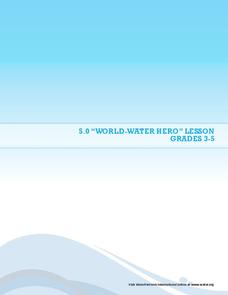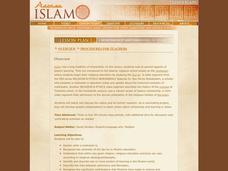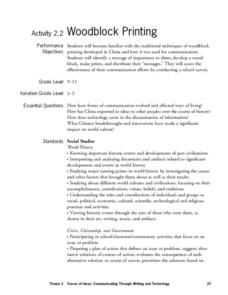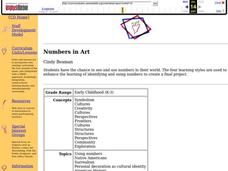Curated OER
Searching for Stars
Positive character traits in literature are explored in this character development and literacy lesson. Learners listen to Cinderella by Charles Perrault and Little Gold Star by Robert D. San Souci, followed by a discussion comparing the...
Curated OER
World-Water Hero
Pupils explore why clean water is essential. For this environmental lesson, students identify the "powers" we need to improve the quality of water. Pupils share their descriptions of world-water superheroes.
Curated OER
Korea's Involvement in World War II Whose Point of View?
Students research different points of view concerning Korea's involvement in World War II.
Curated OER
Teaching About Peace Through the Cranes of Hiroshima
Learners listen to the story of "Sadako and the Thousand Paper Cranes." They discuss the events of Hiroshima, effects of the bombing, and methods people can make a difference in achieving peace in the world. Students use orgami paper and...
Curated OER
African Folktales Lesson
Students explore what a folktale consists of as it relates to oral tradition. In this folktale lesson, students are told the African folktale, Why the Sun is Lives in the Sky and make personal inferences about what the folktale is...
Curated OER
Japan
Learners locate Japan's absolute and relative location on a globe and various maps. They describe Japan's various regions and islands and their system of education, customs and religion. They assess Japan's impact on our society.
Curated OER
The Greek Gods
What were the early Greek myths? Have elementary students examine the Persian Wars and read various Greek myth in order to identify the cause and the results of the Persian Wars. Myths, activities, simulations, and a unit plan are links...
Curated OER
Scholarship and Learning in Islam
Students explain what a madrasah represents in Islam. Using the Muslim world as an example, they identify and describe two or more centers of learning. They explain the contributions that Muslims have made to science and math and...
Curated OER
The Magic of Algebra
Students participate in investigating why the term "magical" is representative of mathematics in general. As the one common language of the world math is magical. To assist students in understanding this magic and to bring...
Curated OER
Aqueduct Architecture: Moving Water to the Masses in Ancient Rome
Ninth graders compare ancient and modern technology in water transporting. In this lesson on the evolution of the aqueduct, 9th graders build a working aqueduct model and examine its components. They explain the importance and use of the...
Curated OER
Woodblock Printing: Early Printing Traditions in China
Students examine important role of woodblock printing in Chinese history, identify message important to them, and create woodblock prints to gain first-hand understanding of how it was used as tool for communication.
Curated OER
Mapping Perceptions of China
Young scholars discuss what types of things are included on a map. They compare and contrast maps of China with a map they create and practice using different types of maps. They write analysis of their classmates maps.
Curated OER
Numbers In Art
Help develop an awareness of the natural and manufactured environment and relate the subject matter to young learners' lives. The interpretation of the meaning of art is reinforced and its application to self and other audiences is...
Curated OER
Discovery Research of Quadratics
Students investigate the properties behind the quadratic equation. In this algebra instructional activity, students identify quadratic equation in the real world. They graph the parabola and identify the vertex and intercepts.
Curated OER
Why Kosovo? Why Now?
Students explain the establishment of the modern state of Yugoslavia and the breakup of the country. They examine the human characteristics of the region - ethnic groups, languages, and religions.
Curated OER
The Rooster Who Went to His Uncle's Wedding
Second graders read and discuss the story "The Rooster Who Went to His Uncle's Wedding" in the Scott Foresman series. They summarize the story. They understand the influence of Latin American Folktales. They complete a quiz on the story.















